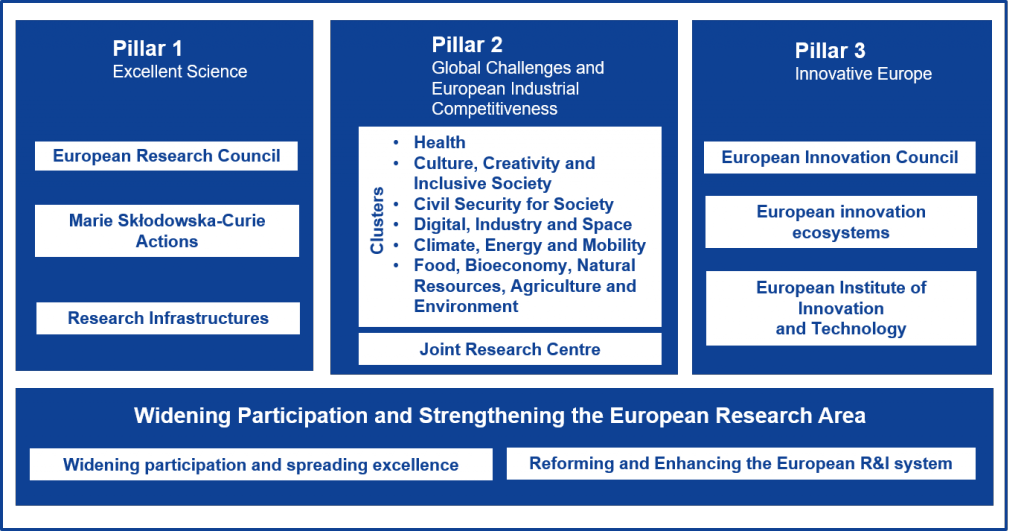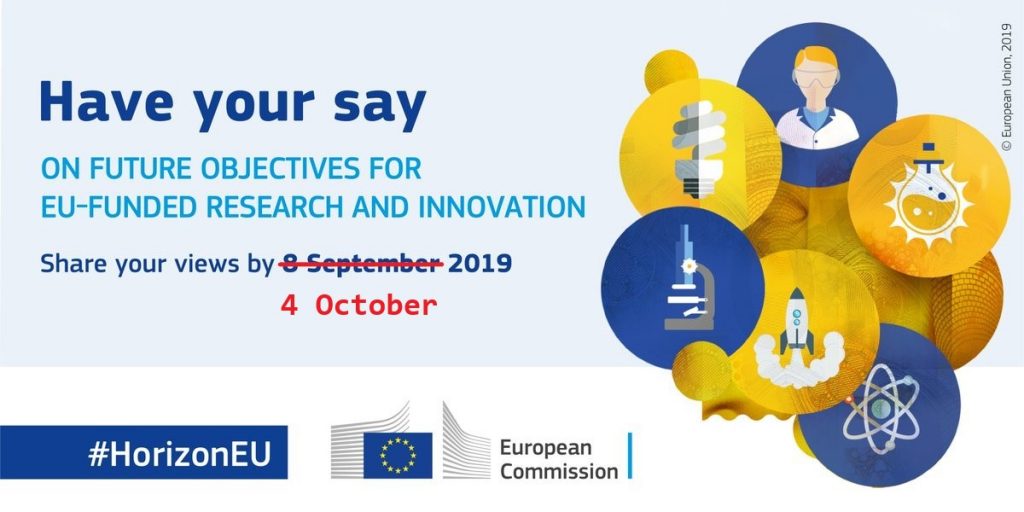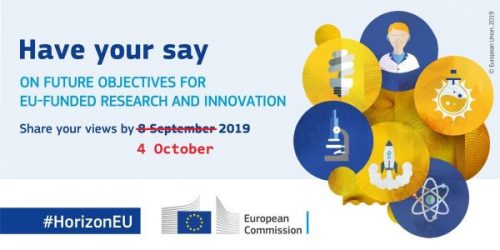The Commission is preparing the implementation of Horizon Europe, the next and most ambitious EU research and innovation programme (2021-2027) with a proposed budget of €100 billion, in an intensive co-design process. It will help shape European research and innovation investments in the coming years. As part of the process, the Commission has launched an online consultation.
Have your say on future objectives for EU-funded research and innovation, mainly the first draft of the so-called Strategic Plan. Have your say on shaping the way Horizon Europe is going to be implemented. Have your say on the next generation of ambitious research and innovation EU partnerships. The co-design process ensures that Horizon Europe is directed towards what matters most, improves our daily lives and helps turn big societal challenges such as climate change into innovation opportunities and solutions for a sustainable future.

The European Parliament and Council reached a political agreement on Horizon Europe in April 2019, on the basis of which the European Commission has started to prepare the programme’s implementation, including through the strategic planning process. This process, focused in particular on Horizon Europe’s second pillar: ‘Global Challenges and European Industrial Competitiveness’, will develop the first ‘Horizon Europe Strategic Plan (2021-2024)’. The plan will identify major policy drivers, strategic policy priorities, and targeted impacts to be achieved as well as identify missions and European Partnerships.
The first ‘Horizon Europe Strategic Plan’ shall to be endorsed by the first quarter of 2020 at the latest, so that it can be used to start work on the preparation of specific Work Programs. This would allow the launch of the first Horizon Europe competitions in January 2021, subject to agreement between the European Parliament and Council on the EU’s long-term budget (2021-2027) and its related horizontal provisions.
Below is a summary of the ongoing consultations regarding the preparation of Horizon Europe and its future key R&I priorities. We will discuss the details of consultations on the strategy for implementation of the programme and its European partnerships under a separate post. We also encourage representatives of research performing organizations in Poland as well as individual researchers and innovators to participate in the co-creation process. Below we also publish a number of materials that can be helpful in consulting the first Strategic Plan, in particular in the key orientations of EU-funded research & innovation under the so-called clusters of the 2nd pillar of Horizon Europe.
Consultations on the priorities and future goals for R&I in the EU

What do you think are the most pressing challenges that EU-funded research and innovation should tackle? What are the most important impacts – scientific, technological, economic, societal – that EU-funded research and innovation should target?
Now you can share your views with the European Commission, which invites anyone with an interest in future EU research and innovation priorities, anywhere in the world, to participate in the consultation, which will close with the extended deadline of 4 October 2019.
The consultation online survey is available under the link.
It is recommended that prior to responding to the questions, you read the attached document: ‘Orientations towards the first Strategic Plan implementing the research and innovation framework programme Horizon Europe’. Due to the fact that reading this material may not be easy, while at the same time not all participants of the consultation are equally interested in all parts of the process, the PolSCA Office split the document in accordance with its sections. Particular files can be found on the PolSCA website in the “Publications” tab under the post Horizon Europe – Orientations towards the first Strategic Plan…
As part of the support provided to the Institutes of the Polish Academy of Sciences, the PolSCA Office also prepared additional materials, i.e. introduction and explanations regarding the part ‘General Orientations‘ and the part ‘Key Strategic Orientations‘. In addition, in cooperation with the Chancellery of the PAN, a proposal of the consultation input for use within the Academy was prepared. This included two segments: (Section B) Where should Horizon Europe play its greatest role? and (Section C) What kind of impacts should Horizon Europe targets? The above-mentioned materials were circulated among all PAN Institutes as a mean of encouragement for participation in the consultation process.
How can one provide a merit-based input on priorities and future goals for R&I in the EU?
To do so, the last part of the consultation form should be used (Section D). This is where one can provide further general input regarding the targeted impacts from Horizon Europe. Unfortunately, the space is limited to 5000 characters maximum, so one have to be concise and compact when forming specific input.
One has to bear in mind, that the consultation process builds on the legislative text of the Specific Programme , and aims to develop it further in terms of expected impacts, with a clear participation of the R & I community. The overarching goal of this co-creation process – based on a pre-defined global challenges and their drivers and current EU policies– is to identify key research and innovation orientations for the first four years of the HEU, i.e. 2021 – 2024.
Clearly, that not all areas of intervention (AoI)as indicated in clusters of the Specific Programme will be covered by the first Strategic Plan for 2021 – 2024. Under the co-design it will be decided which of these specific topics shall be put forward first, thus leaving some topics to be developed later in the course of HEU implementation, i.e. second Strategic Plan for 2024 – 2027. Hence, over the consultation process, one can flag key R&I orientations that seem of urgent priority, while highlighting others to be postponed. At the same time, one can suggest to add new key R&I orientations that are not yet included, but were foreseen within the legislation text.
The intention of the co-creation process is not to add yet another set of R&I topics to the list. Commission rather seeks to look for expected impacts of R&I actions performed under future EU-funded projects. Thus, the reverse logic must by applied, i.e. what is the scientific, innovative or societal impact of the particular research programme at the European level (i.e. EU added value) and whether it could be aligned with existing clusters of the Specific Programme. If so, one might try to highlight those, flag them as critically important for European community, try to provide arguments to enhance its potential impact and bring it to the front of the attentions, and thus – possibly – have it included in the draft of the first Strategic Plan.
Summary
We at the PolSCA Office encourage all active in members of the Research and Innovation communities across Poland, especially those affiliated at the Polish Academy of Sciences to take an active role in the ongoing process. So far, more than 6000 responses have been provided to the EC services, while Poland contributed to only around 170 feedbacks (as for 8th September). Therefore, in order to make the voice of our community be heard, we must be proactive and show what are the future priorities and objectives that matter the most for us!



